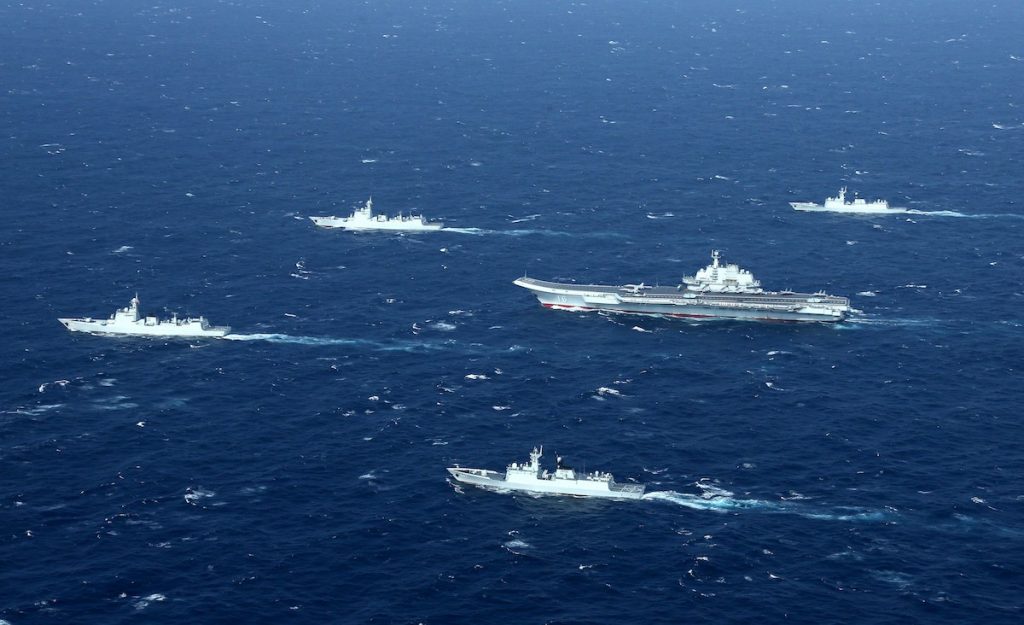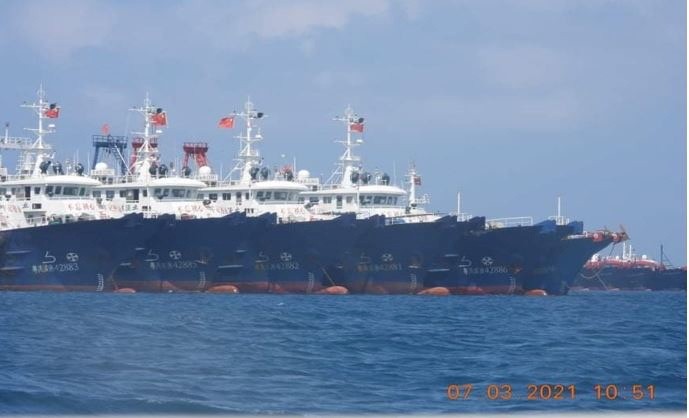A Philippine Catholic bishop expressed alarm over the presence of Chinese vessels in disputed waters off the coast of Palawan province in the South China Sea.
“My reaction is it is alarming, and my message is I hope it will be resolved peacefully,” said Bishop Socrates Mesiona of the Apostolic Vicariate of Puerto Princesa.
The Philippines has complained to China about what it called a “swarming and threatening presence” of Chinese vessels in disputed waters and demanded they be withdrawn from the area.
Philippine officials reported about 220 vessels, believed to be manned by Chinese maritime militia personnel, were seen anchored at the Whitsun Reef, which Manila calls the Julian Felipe Reef, on March 7.
The Chinese Embassy in Manila said they were fishing vessels taking shelter from rough seas.
“The continued deployment, lingering presence and activities of Chinese vessels infringe upon Philippine sovereignty,” the Philippine foreign ministry said in a diplomatic protest, adding “their swarming and threatening presence creates an atmosphere of instability.”
The Chinese Embassy rejected the accusations.
“There is no Chinese maritime militia as alleged. Any speculation as such helps nothing but causes unnecessary irritation,” it said in a statement.
‘External countries’ stoking tensions
China’s embassy in the Philippines has blamed “some external countries” for stoking tensions in the region, in remarks aimed at Japan after its ambassador stressed the need for peace and stability and in the South China Sea.
“Within our region tensions are rising because some external countries are bent on playing fusty geopolitical games,” the Chinese embassy said on Twitter.
“It is a pity that some Asian country, which has disputes in the East China Sea and is driven by the selfish aim to check China’s revitalization, willingly stoops as a strategic vassal of the US,” it said.
The comment was a direct response to a Twitter remark by Japan’s ambassador to the Philippines Koshikawa Kazuhiko, who on Tuesday said his country “opposes any action that heightens tensions” in the South China Sea, and supports international efforts to keep the waters peaceful and open.
China’s extensive territorial claims in the East and South China Seas have become a priority issue in an increasingly testy Sino-US relationship and are a security concern for Japan.
Philippine military chief Cirilito Sobejana on Wednesday said he had instructed the navy to deploy more boats “to increase our visibility and ensure the security and safety of our fishermen.”
Sobejana said China’s defense attache had met Philippine military representatives on Wednesday after being asked to explain the maritime militia, but he had yet to briefed on the meeting.

‘Clear provocative action’
Philippines Defense Secretary Delfin Lorenzana called the presence of militia vessels a “clear provocative action of militarizing the area” and urged China to recall them.
The US Embassy in Manila said the Chinese boats had been mooring in the area for many months in increasing numbers, regardless of the weather.
In a tweet, State Department spokesman Ned Price said Washington “stands with our ally, the Philippines, regarding concerns about the gathering of (Chinese) maritime militia vessels near Whitsun Reef.”
“We call on Beijing to stop using its maritime militia to intimidate and provoke others, which undermines peace and security,” he said.
An international tribunal invalidated China’s claim to 90 percent of the South China Sea in 2016, but Beijing does not recognize the ruling and has built islands in disputed waters equipped with radar, missiles batteries and hangers for fighter jets.
Jay Batongbacal, a South China Sea expert at the University of the Philippines, said President Rodrigo Duterte’s “friendship policy” to move away from Washington and align more closely with China was to blame for the incursions.
“Whatever opportunities there were for us to slow them down or stop them they have been lost,” said Batongbacal. – with a Reuters report









